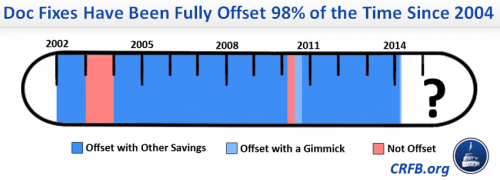A second point that was cut from my piece at The Upshot reinforces the claim I made that congressional “doc fixes”—patches to the formula that would otherwise demand steep cuts to Medicare physician payments—are fiscally responsible: doc fixes are almost always paid for, and typically with cuts to other health care programs. I’m absolutely not claiming that’s good policy, but it is fiscally responsible nonetheless.
A common attack on Medicare’s Sustainable Growth Rate (SGR) formula and its handling by Congress is that legislators engage in budget games and never pay for SGR overrides (i.e., doc fixes). According to analysis by The Committee for a Responsible Federal Budget, over the last decade at least, nothing could be further from the truth. SGR overrides have almost always been paid for by cuts elsewhere, most often from health care programs.
[S]ince [2004 lawmakers] have offset 120 out of the 123 months of doc fixes with equivalent savings. That’s 98 percent. Even ignoring the couple times small gimmicks were used, policymakers still paid for these delays 95 percent of the time—with almost all of those savings coming from health care programs. [Emphasis original.]
The most recent override follows the pattern of fiscal responsibility, apart from a budgetary timing gimmick that accounts for one-fifth of the cost offset.
To be sure, the way Medicare pays physicians could due with some reform. And Congress may consider scrapping the SGR in favor of a relatively more sensible system. Nevertheless, as flawed a design as it is, the SGR has motivated quite small updates in payments. And those updates have been largely paid for in the last decade.



